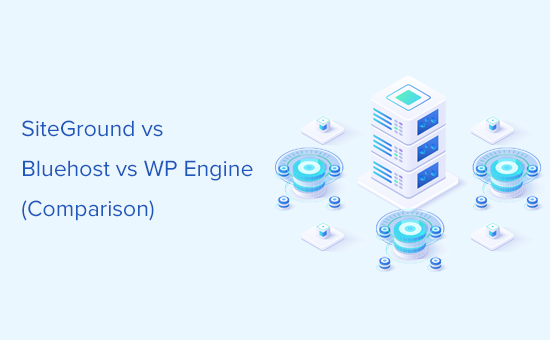Are you looking for an honest web hosting comparison of SiteGround vs Bluehost vs WP Engine?
These top WordPress hosting companies are recommended by WPBeginner and many other industry experts. However, for beginners it’s often not clear which one is better for them.
In this guide, we will compare SiteGround vs Bluehost vs WP Engine with their pros and cons, so that you can make the right decision.

Comparison of SiteGround vs Bluehost vs WP Engine
At WPBeginner, we recommend SiteGround, Bluehost, and WP Engine as the top WordPress hosting services on the market.
And we don’t say it lightly. Over the years we have worked closely with dozens of WordPress hosting companies and know the pros and cons of the overall hosting industry.
To be even more confident in our recommendation, we regularly run tests, with real websites and data, on all these top hosting providers.
Now, if all three of them are good, then it comes down to each user’s own hosting requirements and needs.
For instance, some users may want to go for a low pricing option to control their website costs. Whereas other users may need a hosting solution that offers better support options.
In this comparison, we will take a closer look into the Pros and Cons of SiteGround vs Bluehost vs WP Engine in details. However, if you don’t want to go through the full comparison, here is a quick summary:
| SiteGround | Bluehost | WP Engine | |
|---|---|---|---|
| Pricing | $6.99 | $2.75 | $20 |
| Free Domain | No | Yes | No |
| Free SSL | Yes | Yes | Yes |
| Avg. Load Time | 491 ms | 1.48ms | 337 ms |
| Support | Live Chat / Email / Phone | Live Chat / Email / Phone | Live Chat / Email / Phone |
| Rating | A+ | A- | A+ |
| Verdict | Best Premium Hosting | Best Cheap Hosting | Best Managed Hosting |
| Visit SiteGround | Visit Bluehost | Visit WP Engine |
That being said, let’s compare each one of them and see how they stack up.
SiteGround Comparison
SiteGround is one of the highest-rated WordPress hosting companies and an officially recommended WordPress hosting provider. They offer excellent customer support, top-notch performance, and a very beginner-friendly hosting setup.
They have a highly optimized WordPress hosting platform with their custom in-house performance optimizations. This makes your website incredibly fast which is good for SEO and user experience.
Pros of SiteGround
Each WordPress hosting provider has its pros and cons that you would want to know before signing up. SiteGround gives you some great benefits out of the box.
Let’s take a look at some of the advantages of choosing SiteGround as your hosting service.
Faster Website – SiteGround offers a highly optimized WordPress hosting platform with its own performance optimizations. Their servers are hosted on the Google Cloud Platform which is one of the fastest cloud hosting infrastructure on the market. Faster sites help you improve your search engine rankings.
Excellent Customer Support – SiteGround offers heroic customer support with fast response times, knowledgable and skilled live chat, and 24/7 phone support.
Multiple Geographic Locations – SiteGround allows you to easily select your server’s geographic location. For instance, if your customers are primarily located in Asia, then you can select servers located in Asia (Singapore). Other datacenter locations include: USA, Australia, United Kingdom, Germany, and Netherlands.
Free CDN and SSL – SiteGround allows you to easily turn on Cloudflare free content delivery network (CDN) for your website. It also makes it super easy to add free SSL certificate on your site using Let’s Encrypt.
Daily Backup – They include daily backup on all their plans, and you can get on-demand backup copies on their higher plans.
WordPress Site Migration – SiteGround comes with a migrator plugin that makes it easy for you to move your WordPress website from another host to SiteGround.
Dev Tools – All plans come with WP-CLI and SSH support. With their GrowBig plan, you get access to staging environment, ability to add collaborators, and WordPress supercacher performance boosters. The GoGeek plan comes with dev tools like GIT, Ultrafast PHP, white-label clients, and more.
Cons of SiteGround
There are also some disadvantages of using SiteGround that some users may find a deal breaker.
Higher Monthly Costs – If you choose to pay month to month, then their hosting plans would become quite expensive. You can save on that by signing up for a yearly plan.
Storage Limits – There is a fixed storage available for each hosting plan. It is quite large and most website owners wouldn’t need extra storage, but it is still something you should keep in mind.
SiteGround Review
SiteGround has a 4.9 star rating on WPBeginner based on 4,506 user reviews. You can read more about their hosting score and performance tests in our detailed SiteGround Review.
We also use SiteGround to host the WPBeginner website. See why we switched to SiteGround.
The best part about SiteGround is that you can use their StartUp plan to get started at an affordable price and grow into their VPS and Dedicated Servers as your website grows. They have a 30 day money-back guarantee which is the industry standard.
Bluehost Comparison
Bluehost is one of the biggest web hosting companies in the world and an officially recommended WordPress host. They offer WordPress optimized hosting plans with faster servers and reliable performance.
Their shared hosting prices are lower priced when compared to SiteGround and WP Engine. This makes them a good choice for beginners & small businesses on a limited budget.
Pros of Bluehost
Bluehost offers great value at low cost but what are some of their pros and cons? Let’s start with some of the benefits of using Bluehost as your hosting service.
Lower Costs – Bluehost’s entry-level plan allows you to start for a lower price which is a great value for new small businesses, bloggers, portfolio, and other type of websites.
Ease of Use – It has one of the most beginner-friendly hosting control panel that makes it super easy to install WordPress (one-click) and manage your website.
Free Domain – They offer a free domain name which saves you additional money on your start up cost.
Free CDN + Free SSL – Bluehost offers free CDN to speed up your website, and all plans come with free SSL certificate to improve website security.
Website Speed – In our tests, we found Bluehost to perform well with no performance optimization done on our test sites. You can add WordPress caching plugins to unlock further speed improvements.
Staging Sites + Dev Tools – Bluehost plans come with staging site setup, automatic WordPress updates, ability to change PHP versions, SFTP access, and more.
Cons of Bluehost
Obviously, there are some downsides to using Bluehost as well. The following are some of the disadvantages that you may want to know.
Higher domain renewal price – Their free domain renewal price is higher than average. It does not make an immediate impact on most businesses but it is something you may need to keep in mind.
Upselling addons – You’ll see a lot of upselling during signup. Most beginners usually don’t need these products right away so you can skip them.
Bluehost Review
Bluehost has a 5-star rating on WPBeginner based on over 300 user reviews and because of the price to value they offer. We also ran our own performance and stress tests on their servers, you can read all about them in our detailed Bluehost review.
The best part about Bluehost is that you get a free domain with all plans, unlimited bandwidth & SSD storage on their Plus plan, and great overall value for what you pay.
Their Ecommerce hosting plan for WooCommerce comes with over $1000+ in premium WooCommerce & WordPress extensions which is a huge cost savings for online store owners.
WP Engine Comparison
WP Engine is one of the topmost recommended managed WordPress hosting providers in the world. They are among the pioneers of managed WordPress hosting services.
On a managed WordPress plan, the hosting provider offers a highly optimized environment with custom caching built-in. The hosting provider also takes care of updates and backups.
WP Engine provides a robust platform used by businesses and agencies alike. It is easy enough for beginners to manage their website and advanced for developers and agencies to host client sites.
Pros of WP Engine
WP Engine offers a powerful hosting solution, but there are pros and cons that you should look at beforehands. Following are some of the advantages of using WP Engine.
Reliability – WP Engine’s proprietary technology can easily handle traffic spikes without any downtime or slowing down your website.
Security – It comes with many advanced security features to block DDoS attacks, brute force attacks, JavaScript/SQL-injection attacks, and more. They also offer a free cleanup service if your site gets hacked on their platform.
Daily Backup – They include daily backup as part of all their plans.
Advanced Features – WP Engine offers advanced features for developers, businesses, and agencies including 1-click staging websites, GIT version control, transferable installs, and more.
Speed – WP Engine’s EverCache offers server level caching for everything including a CDN to ensure faster load times.
Free Themes – All WP Engine accounts include 30 premium WordPress themes from StudioPress which is a great value for WordPress users.
Cons of WP Engine
WP Engine offers cutting-edge technologies and powerful web hosting services, but there are some disadvantages too.
Blocked Plugins – WP Engine maintains a list of WordPress plugins that you cannot install on your site. These plugins are either incompatible or conflict with the existing WP Engine features.
Expensive – WP Engine is more expensive than shared hosting platforms. The services they offer are well-worth investment if your business can afford it.
WP Engine Reviews
WP Engine has a 4.9 star rating on WPBeginner based on 64 user reviews. We also ran our own tests to measure their performance and reliability, you can read all about it in our complete WP Engine review.
The best part about WP Engine is that they offer a reliable platform which is great for uptime and an excellent support team that is always there to help when needed. Overall, WP Engine is by far the most reputable managed WordPress hosting provider in the world.
SiteGround vs Bluehost vs WP Engine – Which is Better?
Now that we have compared different features of SiteGround vs Bluehost vs WP Engine, you may still be wondering which one of them is better?
The answer actually depends on your own requirements.
For instance, if you want to start an online business or a new online store, but don’t want to spend a fortune, then Bluehost offers an excellent value. It is low cost and offers a reliable, fast, and easy to use platform.
On the other hand, if you can afford to spend a little more on premium hosting, then SiteGround would be a better choice for you. For extra money you get faster support, optimized WordPress platform, and super fast website. It gives you the best of both worlds, great value and great performance.
Lastly, if you are looking for a concierge WordPress hosting service, then WP Engine offers an all in one platform. It is robust, easy to use, advanced features for developers, offers enhanced security, and more.
Frequently Asked Questions (FAQs)
Having helped thousands of users choose the best web host for their needs, we have answered quite a few questions. Here are some of the answers to the most frequently asked questions about SiteGround vs Bluehost vs WP Engine.
How did you check the web hosting speed for Bluehost vs SiteGround vs WP Engine?
We use independent third-party tools like Pingdom, LoadImpact, and Bitcatcha to test the performance and reliability of each company, so we can help you choose the best WordPress hosting for your business.
To accurately measure performance across all WordPress hosting companies, we create a sample WordPress site on each hosting provider and install the default WordPress theme. Next, we import sample content including images and media, so our test resembles an average user website.
You can see detailed performance test results in our detailed Bluehost review, SiteGround review, and WP Engine review.
Can I use Subdomains for my site?
Yes, you can use subdomains on all three of these companies. If it’s a staging site, then it doesn’t count against your 1 website limit. However if you’re looking to create multiple websites, then you’ll need to upgrade to a higher plan.
Does SiteGround use cPanel?
No, SiteGround does not use cPanel. They have built a custom control panel to offer an improved user experience. This has allowed them to add more premium tools similar to WP Engine.
Between SiteGround, WP Engine, and Bluehost, only Bluehost still offers cPanel hosting. Even though Bluehost has created a custom control panel as well, you can click on the Advanced menu to access cPanel inside Bluehost.
Does WP Engine offer email accounts?
No, WP Engine does not offer email accounts. They specialize in managed WordPress hosting services and prefer that you use specialized business email address solutions like Google Workspace (G Suite).
Bluehost and SiteGround on the other hand both offer free business email addresses that you can create from your account area. Bluehost also let you purchase premium business emails from Office365 right inside the Bluehost dashboard.
If you’re looking to fix email deliverability for sending bulk emails, then all providers recommend that you use a reliable third-party SMTP service with the WP Mail SMTP plugin.
For sending marketing emails, we recommend that you use a proper email marketing service. Here’s a list of the best email marketing services.
Why is SiteGround so expensive?
When comparing with other shared hosting providers like Bluehost, HostGator, Dreamhost, etc, SiteGround pricing can definitely be considered more expensive. However it’s because they have significantly improved their infrastructure by making the switch to Google Cloud platform. They have also built advanced caching to boost performance, powerful development tools like Staging sites, Git workflows, Ultrafast PHP, WP CLI support, and more.
Previously you’d have to upgrade to a managed WordPress hosting provider to get these powerful features. Now SiteGround offers these to small businesses at a more affordable price.
It’s really not fair to compare SiteGround prices with other shared hosting companies anymore because they’re truly creating a new category for premium WordPress hosting.
When do you need managed WordPress hosting?
As a beginner, you might be wondering is managed WordPress hosting really that much better? If so, then when is the right time to upgrade to managed WordPress hosting.
We have covered all of this in our detailed guide on when do you need managed WordPress hosting.
But in summary, if you’re just starting a blog or a small business website, then you don’t need managed WordPress hosting.
As your website grows, and you start getting high-traffic, then we recommend considering a managed platform, so you can delegate the technical side and focus on growing your business.
However if you have the budget to spend a bit more for exceptional service, then you can use managed hosting at any time you’re ready.
Are there other hosting providers that you haven’t covered in this comparison?
Yes there are literally thousands of web hosting companies in the market including HostGator, GoDaddy, Dreamhost, InMotion Hosting, Hostinger, GreenGeeks, Pagely, Liquid Web, Kinsta, A2 hosting, etc.
We only compared SiteGround vs Bluehost vs WP Engine because they’re the most popular WordPress hosting companies.
Do you have any special discounts for SiteGround, Bluehost, or WP Engine?
Yes, because WPBeginner is the largest WordPress resource site, our users can get special discounts on popular hosting providers as well as other WordPress plugins. You can see all 100+ WordPress deals here.
You can use our Bluehost coupon to get over 60% off + free domain.
Our WP Engine coupon gets you 4 months free on the annual plans.
Our SiteGround coupon gets you over 63% off on web hosting.
We hope this comparison of SiteGround vs Bluehost vs WP Engine helped you decide which platform is better for your new website. You may also want to see our checklist of things to do before launching a WordPress site, and our expert pick of best WordPress plugins for all websites.
If you liked this article, then please subscribe to our YouTube Channel for WordPress video tutorials. You can also find us on Twitter and Facebook.
The post SiteGround vs Bluehost vs WP Engine (Honest Comparison) appeared first on WPBeginner.




